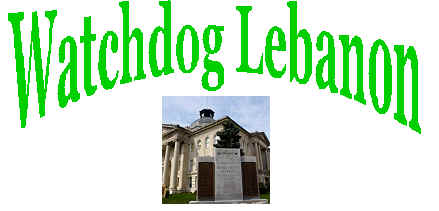Watchdog Lebanon Home
Page
 (Note: This Hit Counter was effective October 25, 2013.)
(Note: This Hit Counter was effective October 25, 2013.)
 Watchdog Indiana Home Page
Watchdog Indiana Home Page
 Watchdog
Vigilance Home Page
Watchdog
Vigilance Home Page

 Watchdog Lebanon provides information about the revenues, spending, and long-term debt
assumption of the local and county governments in Boone County. An online community is
established where Boone County Hoosiers work together to help promote good
public policy. This volunteer
effort is non-party, non-connected, and non-profit.
Watchdog Lebanon provides information about the revenues, spending, and long-term debt
assumption of the local and county governments in Boone County. An online community is
established where Boone County Hoosiers work together to help promote good
public policy. This volunteer
effort is non-party, non-connected, and non-profit.
Watchdog Lebanon is an
advocate for good government that focuses on
the local tax burden of Boone County working families.
"The credit belongs to the man who is
actually in the arena, ... who at the best, knows in the end the triumph of high
achievement, and who at worst, if he fails, at least fails while daring greatly,
so that his place shall never be with those cold and timid souls who know
neither victory nor defeat." - Theodore Roosevelt
Watchdog Lebanon was founded by Aaron Smith on November 14, 2001.
Aaron's resides in Lebanon Indiana, and his biographical information can be
found online at http://www.finplaneducation.net/aaron.htm.
 Subscribe!
Subscribe!
Subscribe to receive
Watchdog Lebanon E-mail notifications whenever something comes up that is likely
to affect local government taxes and spending in Boone County. Put WHAT'S NEW in the subject line of your E-mail
sent to taxless3@comcast.net.
 Immediate action needed!
Immediate action needed!
12/14/2023:
 Did
You Know?
Did
You Know?
06/18/2020: Two deadly force categories
of neck restraints are recognized for use by law enforcement agencies: (a)
the chokehold that restricts a suspect's ability to breathe by applying
pressure to the suspect's windpipe and (b) the vascular neck restraint
that temporarily cuts off blood flow to the brain causing a suspect to go
unconscious for a short period (when properly applied to a healthy
suspect). Relevant information about the use of neck restraints by the
Lebanon Police Department can be found online at http://finplaneducation.net/LPD_Neck_Area.htm.
Also, relevant information about the use of neck restraints by the Boone
County Sheriff's Office can be found online at http://finplaneducation.net/BCSO_Neck_Area.htm.
 Lebanon
Sanitary Sewer Backup Prevention
Lebanon
Sanitary Sewer Backup Prevention
Raw sewage backups in Lebanon homes present
serious health hazards from exposure to the pathogens and allergens that
fester in sewage waste. The Indiana State Department of Health
has identified the following diseases caused by raw sewage and sewage
contaminated water: Campylobacteriosis, Cryptosporidiosis, Escherichia
coli Diarrhea, Encephalitis, Gastroenteritis, Giardiasis, Hepatitis
A, Leptospirosis, Methaemoglobinaemia, Poliomyelitis, Salmonellosis,
Shigellosis, Paratyphoid Fever, Typhoid Fever, and Yersiniosis. Details
regarding these dangerous diseases can be found online at http://www.in.gov/isdh/22963.htm.
The elimination of improper sump pump and other connections to the
sanitary sewer system is an important first step in preventing Lebanonís
sanitary sewer backups. A Special Report has been prepared by Watchdog Lebanon regarding the
prevention of sanitary sewer backups in Lebanon homes. The Special Report
sections include (1) Introduction, (2) Lebanon Sanitary System Overview,
(3) Lebanon Sanitary Sewer Backup Sources, (4) Lebanon Sanitary Sewer
Backup Solutions, (5) Proper Storm Water Management For Morningside &
Edgewood Homeowners, (6) Voluntary Compliance Is Important, (7) Home Sump
Pumps A Likely Problem, (8) Disconnecting Home Sump Pumps Will Prevent
Most Sanitary Sewer Backups, (9) Payment Options To Correct Improper
Sanitary Sewer Connections. The Special Report can be found online at http://www.finplaneducation.net/sewer_backup_prevention.htm.
The raw sewage backups into some Lebanon homes during significant rain
events must be eliminated because they create serious health hazards.
|
Lebanon Topics Index |
| Boone
County Free Public Records Directory |
| Consumer
Price Index |
| Family
Meals Tax: Lebanon Food and Beverage Tax. |
| Free
Speech Guarantees |
| Get-Ahead
Wage |
| Greater
Lebanon Community Vision Committee |
| Huck Lewis Campaign
Contributions: 2010-2015
Summary and 2014 Receipts & Expenditures
and 2015 Receipts &
Expenditures |
| Huck
Lewis Election Law Violations Complaint |
| Indiana
Statewide COVID-19 Statistics |
| Lebanon
Backyard Chickens |
| Lebanon Business Park: 2014 Property Taxes
and 2014 School Taxes and Tax
Increment Financing Area Impact. |
Lebanon Candidate
Information:
2015 Lebanon Mayor Candidates: Matt
Gentry, Harold
"Huck" Lewis
2015 Lebanon City Council Candidates: Keith
A. Campbell, John Copeland,
Dan Fleming, Larry
A. Hysong, Mike Kincaid,
Lana M. Kruse, Corey
Kutz, Jeremy Lamar, Steve
Large, Preston Myers, Kevin
Van Horn
2014 Lebanon Community School Corporation Board of Trustees
Candidates: Allen D. Douglass,
Elizabeth Padgett (Liz) Keith, Tom
Merritt
2011 Lebanon Candidates
(Lebanon Clerk Treasurer)
2007 Lebanon Candidates
(November 6, 2007, Lebanon Mayor General Election)
2003-2005 Lebanon City
Council Voting Record
2002-03 Lebanon Candidates (November 4, 2003, Lebanon Mayor and City Council
General Election; November 5, 2002, Boone County
Council District 3 General Election; May 7,2002, Boone County
Commissioner District 1 Republican Primary) |
| Lebanon
Cash Reserves |
| Lebanon
City Attorney |
| Lebanon City Budgets: 2015
and 2016. |
| Lebanon
City Council Election Districts |
| Lebanon
City Expenditures Per Capita |
| Lebanon
City Finances: 1997-2004
and 2004-2015 |
| Lebanon
Clerk-Treasurer Attorney |
| Lebanon
Conservation League Purchase |
| Lebanon
Eminent Domain Coercions |
| Lebanon
"Gateways" - Indianapolis Avenue Project |
| Lebanon
"Gateways" - SR 39 Bridge Project |
| Lebanon
Growth Projections |
| Lebanon Hot Pond |
| Lebanon
I-65 Corridor Annexation |
| Lebanon
I-65 Corridor Master Drainage Plan |
| Lebanon
Interchange Land Use Plan |
| Lebanon Iron Men
Properties Projects: Memory Hall Flats,
The Flats at Memory Hall, The
451 Flats. |
| Lebanon
Memorial Park Swimming Pool |
| Lebanon
Municipal
Building |
| Lebanon
Police Department Use of Force: Neck Area |
| Lebanon
Property Tax Bills Database |
| Lebanon
Property Tax Comparison: Residential and Farm. |
| Lebanon
Property Tax Multiple Homestead Deductions |
| Lebanon
Property Tax Rates |
| Lebanon
Property Taxes |
| Lebanon Public
Library Expansion |
| Lebanon
Public Library Expenditures Per Capita |
| Lebanon
Public Library Taxpayer Friendly Action Plan |
| Lebanon
Redevelopment Commission |
| Lebanon
Rental Inspections: Includes Lebanon
2014 & 2015 Fire Fatalities and Lebanon
O.P.E.N. Rental Inspection Program. |
| Lebanon
Schools - 2010 Referendum |
| Lebanon
Schools - 2022 Referenda |
| Lebanon
Schools - Alternative High School (The Crossing National, Inc.) |
| Lebanon
Schools - Education Outcomes Comparison (Public School
Corporations with Boone
County Students): 2014
and 2013. |
| Lebanon
Schools - Expenditures Per Capita & Student |
| Lebanon
Schools - Finances |
| Lebanon
Schools - Herman B Wells Community Conference Center |
| Lebanon
Schools - Lebanon Business Park School Taxes |
| Lebanon
Schools - New School Need |
| Lebanon
Schools - Property Tax History |
| Lebanon
Schools - Superintendent Compensation |
| Lebanon
Sump Pump Program: Estimated Costs |
| Lebanon
Storm Water Management - 2016 Proposed Fee Increases |
| Lebanon
Storm Water Management - Overview |
| Lebanon
Tax Abatements |
| Lebanon
Taxpayer Friendly Smart Growth Plan |
| Lebanon
Transportation Funding Increases |
| Lebanon
Utilities - 2010 Operating Efficiency Analysis |
| Lebanon
Utilities - Electric 2012 Rate Increase |
| Lebanon
Utilities - Electric IURC Regulation |
| Lebanon
Utilities - Elizaville Road Project |
| Lebanon
Utilities - Fire Hydrants Analysis |
| Lebanon
Utilities - Hydrant Rental Fee |
| Lebanon
Utilities - New 69 kV Electric Transmission Line |
| Lebanon
Utilities - Payments in Lieu of Taxes (PILOT) |
| Lebanon
Utilities - Telecommunications Division Profitability |
| Lebanon
Utilities - Wastewater 2015 Rate Increase |
| Lebanon
Utilities - Wastewater (Sanitary Sewer) Backup Prevention |
| Lebanon
Utilities - Wastewater (Sanitary Sewer) Financial Analysis |
| Lebanon Utilities -
Wastewater (Sanitary Sewer) Treatment Plant Operation |
| Lebanon
Utilities - Water Capacity |
| Lebanon
Utilities - Water Financial Analysis |
| Lebanon
Vincennes University Gene Haas Training and Education Center |
| Lebanon
Watch Government Meetings Schedule |
| Lebanon
Workforce Development Options |
| Lebanon
Worth Annexation |
| Lebanon's
FAILED "Vision" |
| Local
Government Meetings Schedule |
| Petition
and Remonstrance |
| Population Data: City Of Lebanon; Center
Township; Boone County; State Of Indiana. |
| Public
Access Laws |
| Related Sites:
Boone County Area Plan Commission; Boone County Chamber of Commerce; Boone County Community Network; Boone
County Economic Development Corporation; Boone
County E-mail Directory; Boone County Farm Bureau, Boone County Republicans; Boone REMC; Lebanon (City Of),
Indiana; Lebanon Community School Corporation; Lebanon Community Vision
Committee. |
| Ronald
Reagan Parkway |
| STATS
Indiana: Provides easy, one-stop access to critical statistics
for states, counties, cities and towns, townships, regions, census
tracts, and more. |
| Unemployment
Rates: Hoosiers By The Numbers. |
|
Boone County Topics Index |
|
Boone
County Alcoholic Beverage Board |
|
Boone
County Appointed Local Government Boards |
Boone County Candidate
Information:
2016 Boone County Commissioner Candidates: Andy
Dardini, Larry Hysong, Don
Lawson, Jeff Wolfe.
2016 Boone County Council Candidates: Tad
D. Braner, Brian Buchanan,
Don Cooper, Steve Freeland, Jim
Love, Elise
Nieshalla, Dax Norton, Marcia
C. Wilhoite.
2014 Boone County Commissioner Candidates: Marc
Applegate, Julia Evinger.
2014 Boone County Council Candidates: Ken
P. Campbell, Jon
"Chip" Cravens, John
W. Hamilton, John W. Hume, Jim
Hundley, Steve Jacob, David
Rodgers, Tom
Santelli, Jay Schaumberg, Debby Shubert,
Gene Thompson.
2014 Boone County Superior Court 2 Judge Candidates: Campaign
Fundraising.
2014 Center Township Board Candidates: Penny
S. Bogan, Larry Hysong, Benjamin
"Benjy" Johnson, Tami
Richardson, Richard
"Dick" Robertson, Jane
Ann Taylor, Brent Wheat.
2014 Center Township Trustee Candidates: Randall
"Randy" Large, Eric
R. Ping, Adam Walker, Robert
L. Wirey.
2012 Boone County Candidates
(Boone County Council).
2008 Boone County Candidates
(Boone County Auditor Primary Election).
2006 Boone County Candidates
(Boone County Council General Election).
2004 Boone County Candidates
(November 2, 2004, Boone County
Commissioners General Election; November 2, 2004, Boone County
Council General Election; May 4, 2004, Boone County Commissioners Republican Primary; May
4, 2004, Boone County Council Republican Primary).
2002-03 Boone
County Candidates (November 4, 2003, Lebanon Mayor and City Council
General Election; November 5, 2002, Boone County
Council District 3 General Election; May 7,2002, Boone County
Commissioner District 1 Republican Primary).
2002 Boone County
Council Voting Record. |
| Boone
County Campaign Contributions History (for selected local
candidates within Boone County) |
| Boone
County Commissioner Election Districts |
| Boone
County Council 2014 Budget |
| Boone
County Council 2015 Budget |
| Boone
County Council 2021 Budget |
| Boone
County Cumulative Capital Development Property Tax |
| Boone
County Democratic Party Rules |
| Boone
County Departments & Offices Employment: Compared With
Twenty-Six Selected Indiana Counties. |
| Boone
County Disbursements |
| Boone
County Education Outcomes Comparison (Public School Corporations with Boone
County Students): 2014
and 2013. |
| Boone
County Expenditures Per Capita |
| Boone
County Financial Analysis
(Completed by Watchdog Indiana on April 19, 2012). |
| Boone
County Growth Projections |
| Boone
County Highway Department |
Boone County I-65 North
Overlay District
Overlay
District for the Northern Portion of Interstate 65
I-65
North Overlay Zoning District Document
Land
Owners Within I-65 North Overlay District
Overlay District
Questions for I-65 North Corridor Land Owners
I-65 North Overlay District Map |
| Boone
County Key Bank Building Purchase |
| Boone
County Local Governments Nepotism |
| Boone
County Local Income Tax |
| Boone
County Mapleview Rest Home |
| Boone
County Park Tax |
| Boone
County Police Departments |
| Boone
County Property Tax Bills Database |
| Boone
County Property Tax Multiple Homestead Deductions |
| Boone
County Property Taxes |
| Boone
County Republican Party Rules |
| Boone County Sheriff: Use
of Force: Neck Area and 2016
Business Plan and Office
Management. |
| Boone
County Solid Waste Management District |
| Boone
County Tax Abatements |
| Boone
County Tax Increment Financing Districts |
| Boone
County Transportation Funding Increases |
| Boone
County Utilities |
| Boone County
Water Resources |
| Consumer
Price Index |
| Convention
Center |
| County
Option Income Tax (COIT) |
| Duke
Realty (Anson) Project. |
| Emergency
Telephone System (E911) Fee |
| Free
Speech Guarantees |
| Get-Ahead
Wage |
| Indiana
Statewide COVID-19 Statistics |
| Jeff
Wolfe Campaign Contributions History |
| Local
Government Meetings Schedule |
| Petition
and Remonstrance |
| Population Data: City Of Lebanon; Center
Township; Boone County; State Of Indiana. |
| Public
Access Laws |
| Recount
Commission: 2002 Boone County Commissioner District 1. |
| Related Sites:
Boone County Area Plan Commission; Boone County Chamber of Commerce; Boone County Community Network; Boone
County Economic Development Corporation; Boone
County E-mail Directory; Boone County Farm Bureau, Boone County Republicans; Boone REMC; Lebanon (City Of),
Indiana; Lebanon Community School Corporation; Lebanon Community Vision
Committee. |
| Ronald
Reagan Parkway |
| STATS
Indiana: Provides easy, one-stop access to critical statistics
for states, counties, cities and towns, townships, regions, census
tracts, and more. |
| Thorntown
Clerk-Treasurer Investigation |
| Unemployment
Rates: Hoosiers By The Numbers. |
| Wheel
Tax |
| Worth
Township-Whitestown 2012 Reorganization (Approved
Plan of Reorganization Town of Whitestown and Worth Township)
(defeated by November 6, 2012 referendum). |
 You
Can Help.
You
Can Help.
Listed below are several ways you can help control taxes and spending
in Boone County.
 Bookmark
this website so you can easily visit Watchdog Lebanon often to help learn about cash revenues, cash spending, and long-term debt
assumption in the various Boone County governmental units.
Bookmark
this website so you can easily visit Watchdog Lebanon often to help learn about cash revenues, cash spending, and long-term debt
assumption in the various Boone County governmental units.
 Suggest projects for Watchdog
Lebanon to adopt. Please send an E-mail
if you know of something that needs the attention of Watchdog Lebanon.
Suggest projects for Watchdog
Lebanon to adopt. Please send an E-mail
if you know of something that needs the attention of Watchdog Lebanon.
 Register to vote.
Send an E-mail to the Boone
County Clerk to request information on how and where to register to
vote.
Register to vote.
Send an E-mail to the Boone
County Clerk to request information on how and where to register to
vote.
 Review the
Watchdog Lebanon "Boone County Candidate Information" and
"Lebanon Candidate Information" (see the above Boone County
Topics Index and Lebanon Topics Index) when deciding how to vote in a local
Boone County election.
Review the
Watchdog Lebanon "Boone County Candidate Information" and
"Lebanon Candidate Information" (see the above Boone County
Topics Index and Lebanon Topics Index) when deciding how to vote in a local
Boone County election.
 E-mail to the Editor of your
local newspaper a letter or opinion article about local cash revenues, cash spending, and long-term debt assumption. Use Letters
To The Editor Via E-mail to find the E-mail address of the
Editor of your local newspaper.
E-mail to the Editor of your
local newspaper a letter or opinion article about local cash revenues, cash spending, and long-term debt assumption. Use Letters
To The Editor Via E-mail to find the E-mail address of the
Editor of your local newspaper.
 Use the Local Government
Factfinding List to understand and influence the revenues, spending, and
long-term debt assumption decisions of your local government.
Use the Local Government
Factfinding List to understand and influence the revenues, spending, and
long-term debt assumption decisions of your local government.
Watchdog Lebanon summarizes my use of Boone
County, Indiana, as a case study to demonstrate how you
can work to help control the revenue and spending growth of your local government.
Understanding the Fundamental
Watchdog Beliefs will help you understand the approach taken in this
website. Please send an E-mail telling what you think
about Watchdog Lebanon or anything else that comes to mind. Your comments, suggestions,
problems, complaints, praise, and opinions are welcome.
 Watchdog Indiana Home Page
Watchdog Indiana Home Page
 Watchdog
Vigilance Home Page
Watchdog
Vigilance Home Page
This page was last updated on 12/26/23.
(Note: This Hit Counter was effective October 25, 2013.)
![]() Watchdog Indiana Home Page
Watchdog Indiana Home Page
![]() Watchdog
Vigilance Home Page
Watchdog
Vigilance Home Page

 Watchdog Lebanon provides information about the revenues, spending, and long-term debt
assumption of the local and county governments in Boone County. An online community is
established where Boone County Hoosiers work together to help promote good
public policy. This volunteer
effort is non-party, non-connected, and non-profit.
Watchdog Lebanon provides information about the revenues, spending, and long-term debt
assumption of the local and county governments in Boone County. An online community is
established where Boone County Hoosiers work together to help promote good
public policy. This volunteer
effort is non-party, non-connected, and non-profit.
 Subscribe!
Subscribe! Immediate action needed!
Immediate action needed! Did
You Know?
Did
You Know?  Lebanon
Sanitary Sewer Backup Prevention
Lebanon
Sanitary Sewer Backup Prevention You
Can Help.
You
Can Help.![]() Bookmark
this website so you can easily visit Watchdog Lebanon often to help learn about cash revenues, cash spending, and long-term debt
assumption in the various Boone County governmental units.
Bookmark
this website so you can easily visit Watchdog Lebanon often to help learn about cash revenues, cash spending, and long-term debt
assumption in the various Boone County governmental units.![]() Suggest projects for Watchdog
Lebanon to adopt. Please send an E-mail
if you know of something that needs the attention of Watchdog Lebanon.
Suggest projects for Watchdog
Lebanon to adopt. Please send an E-mail
if you know of something that needs the attention of Watchdog Lebanon.![]() Register to vote.
Send an E-mail to the Boone
County Clerk to request information on how and where to register to
vote.
Register to vote.
Send an E-mail to the Boone
County Clerk to request information on how and where to register to
vote.![]() Review the
Watchdog Lebanon "Boone County Candidate Information" and
"Lebanon Candidate Information" (see the above Boone County
Topics Index and Lebanon Topics Index) when deciding how to vote in a local
Boone County election.
Review the
Watchdog Lebanon "Boone County Candidate Information" and
"Lebanon Candidate Information" (see the above Boone County
Topics Index and Lebanon Topics Index) when deciding how to vote in a local
Boone County election.![]() E-mail to the Editor of your
local newspaper a letter or opinion article about local cash revenues, cash spending, and long-term debt assumption. Use Letters
To The Editor Via E-mail to find the E-mail address of the
Editor of your local newspaper.
E-mail to the Editor of your
local newspaper a letter or opinion article about local cash revenues, cash spending, and long-term debt assumption. Use Letters
To The Editor Via E-mail to find the E-mail address of the
Editor of your local newspaper.![]() Use the Local Government
Factfinding List to understand and influence the revenues, spending, and
long-term debt assumption decisions of your local government.
Use the Local Government
Factfinding List to understand and influence the revenues, spending, and
long-term debt assumption decisions of your local government.![]() Watchdog Indiana Home Page
Watchdog Indiana Home Page
![]() Watchdog
Vigilance Home Page
Watchdog
Vigilance Home Page